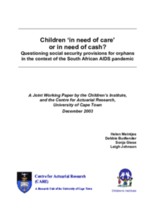In the face of international pressure and local concern regarding the repercussions of the AIDS pandemic for children in South Africa, as well as the review underway of both social assistance and children’s legislation in the country, there is much debate regarding appropriate social security provision for children in the context of HIV/AIDS. To date, the focus has primarily been on exploring different mechanisms for the provision of cash grants to children who have been orphaned. This includes encouragement by the State of the use of the formal foster care system to address the poverty-related needs of orphans, as well as consideration of alternatives recommended by the South African Law Reform Commission in their redrafting of the Children’s Bill.
However, drawing on a combination of primary research and demographic projections, and by costing a range of different social security scenarios, this paper argues against the provision of grants for orphans as a category of children distinct from other children. It argues that, given the pervasiveness of poverty across South Africa’s child population, a social security system that directs interventions on the basis of children’s orphanhood mistargets crucial resources; is inequitable; is located in questionable assumptions about children’s circumstances; risks further overburdening the child protection system; and is not, as a whole, a cost-efficient way of adequately supporting the largest possible number of poor children who require assistance.
This paper argues therefore that the most equitable, accessible and appropriate mechanism for supporting children in the context of the AIDS pandemic would be through the extension to all children of the Child Support Grant mechanism that is currently in place, and for the means test that restricts children’s access to be removed. Progressive implementation of a universal Child Support Grant should be based not on providing grants in the interim to particular categories of children (such as orphans) but rather on drawing more impoverished children – irrespective of their parental circumstances – into the social security ‘safety net’.
©Children's Institute and Centre for Actuarial Research, University of Cape Town

